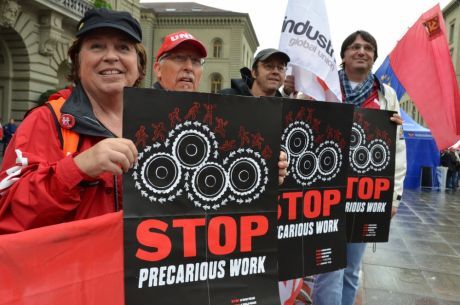Columns
You are here
Solidarity against precarity

June 19, 2015
For many years activists in the trade unions have been fighting for their leadership to take on issues that relate to workers who are not unionized. The campaign in Ontario a number of years ago for a $10 minimum wage was championed by labour and won a 28 per cent increase over three years. More recently the Fight for $15 has also been widely supported by trade unions including the British Columbia and Ontario Federations of Labour.
The Canadian Union of Postal Workers has led a national movement to keep door to door delivery, putting front and centre the needs of the people they serve and not their own potential job losses. They have won strong support in community after community. This has become a major issue in the upcoming federal election—with seniors organizations, disability rights groups and tens of thousands of ordinary citizens coming to the fore denouncing the move to “efficiency” at their expense. This campaign has put the austerity agenda on the defensive.
Changing workplaces review
After major pushing from organizations such as the Workers Action Centre—which has led the Fight for $15 in Ontario—the Liberal government has initiated public consultations on a “Changing Workplaces Review.” It is to look at issues affecting workers in today`s world and assess existing labour and employment law.
Organizations ranging from the United Way, McMaster University and the Canadian Centre for Policy Alternatives have been publishing research findings on the rise of precarious work and the changing workplace. The percentage of those working without benefits, sick days or job security is rising and employment standards and labour law are lagging far behind in providing even the most basic protections.
Unions have been meeting with community organizations and strategizing on putting forward deputations at the hearings. Labour leaders are presenting but there has been a major effort to have those workers who are affected front and centre, speaking of their workplace experiences and the exploitation they are subjected to.
Thanks primarily to community organizing the Toronto Star and other media have been full of stories about the terrible conditions that many workers are facing on a day-to-day basis. The lack of regulation and oversight is shocking.
I spoke this week to a recent immigrant from Pakistan who along with her husband is being paid only $8.00 an hour because “they don’t speak English.” This is significantly below the minimum wage and employers are allowed to get away with it because they are exploiting the most vulnerable workers who are afraid to speak up. A unionized plant where the same work is done pays over $20 an hour. A real concern is that the Liberal government has made it clear that the review will not consider the need to raise the minimum wage.
Deputation and mobilization
Deputations must be done but the work in the community and in our unions to mobilize is critically important to ensure that real change takes place. The Ontario government must understand that there is a broad movement on the ground fighting for the most vulnerable workers. The Workers Action Centre is continuing the Fight for $15 and the Toronto and York Region Labour Council has included this it is demands. There is a real opening for significant changes to take place if the pressure is strong enough.
Trade unionists must continue to work with community organizations to push back against employers and governments and make significant breakthroughs in workers rights on the job. There is an appetite for change in this province and we must do all we can to build unity between union and non-union workers to force the hand of the government.
Section:









